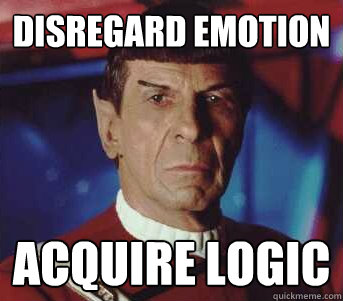Unveiled Artist
Veteran Member
Informal and formal fallacies I often see on RF by non-believers and believers alike in all subjects religious and political. Rhetological Fallacies – A list of Logical Fallacies & Rhetorical Devices with examples — Information is Beautiful
Appeal to Anonymous Authority
Using evidence from an unnamed 'expert', 'study' or generalized group (like 'scientists') to claim something is true.
Appeal to Authority
Claiming something is true because an 'expert', whether qualified or not, says it is.
Appeal to Ignorance
A claim is true simply because it has not been proven false (or false because it has not been proven true).
Just because.
Enjoy.
Appeal to Anonymous Authority
Using evidence from an unnamed 'expert', 'study' or generalized group (like 'scientists') to claim something is true.
Appeal to Authority
Claiming something is true because an 'expert', whether qualified or not, says it is.
Appeal to Ignorance
A claim is true simply because it has not been proven false (or false because it has not been proven true).
1. Appeal to Incredulity
Because a claim sounds unbelievable, it must not be true.
2. Appeal to Popular Belief
Claiming something is true because the majority of people believe it.
3.Appeal to Probability
Assuming because something could happen, it will inevitably happen.
4. Appeal to Tradition
Claiming something is true because it's (apparently) always been that way.
5. Appeal to Consequences of a Belief
Arguing a belief is false because it implies something you'd rather not believe.
6. Composition
Assuming that characteristics or beliefs of some or all of a group applies to the entire group.
7. Confirmation Bias
Cherry-picking evidence that supports your idea while ignoring contradicting evidence.
8. Unfalsifiability
Offering a claim that cannot be proven false, because there is no way to check if it is false or not.
9. Affirming the Consequent
Assuming there's only one explanation for the observation you're making.
10. Circular Logic
A conclusion is derived from a premise based on the conclusion.
11. Appeal to Common Practice
Claiming something is true because it's commonly practiced.
12. Appeal to Ignorance
A claim is true simply because it has not been proven false (or false because it has not been proven true).
13. Appeal to Incredulity
Because a claim sounds unbelievable, it must not be true.
14. Appeal to Wishful Thinking
Suggesting a claim is true or false just because you strongly hope it is.
15. Division
Assuming that characteristics or beliefs of a group automatically apply to any individual member.
16. Jumping to Conclusions
Drawing a quick conclusion without fairly considering relevant (and easily available) evidence.
17. Ad Hoc Rescue
Trying to save a cherished belief by repeatedly revising the argument to explain away problems.
18. Red Herring
Introducing irrelevant material to the argument to distract and lead towards a different conclusion.
19. Cum Hoc Ergo Propter Hoc
Claiming two events that occur together must have a cause-and-effect relationship. (Correlation = cause).
20. Post Hoc Ergo Propter Hoc
Claiming that because one event followed another, it was also caused by it.
21. Circumstance Ad Hominem
Stating a claim lacks credibility only because of the advocate’s interests in their claim.
22. Straw Man
Creating a distorted or simplified caricature of your opponent's argument, and then arguing against that.
Just because.
Enjoy.
Last edited:

